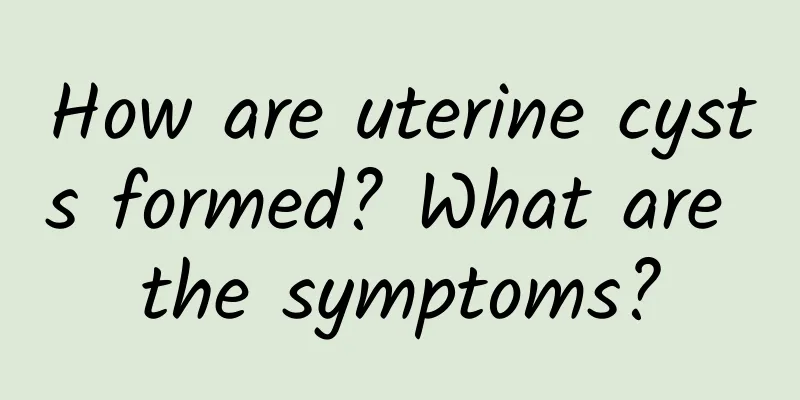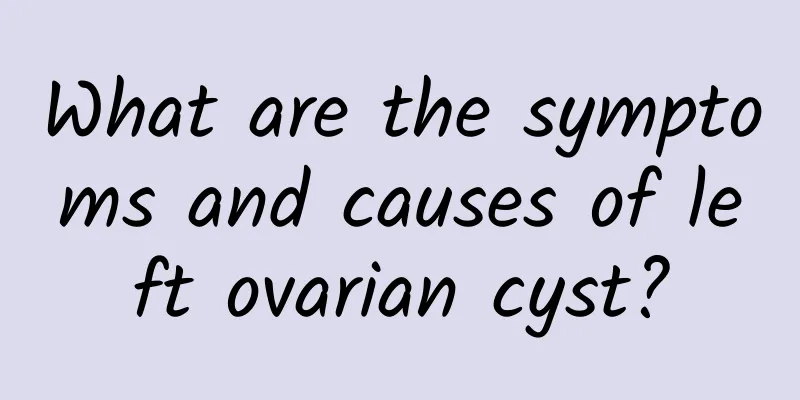How are uterine cysts formed? What are the symptoms?

|
The formation of uterine cysts may involve a variety of factors, including endocrine disorders or chronic infections. Uterine cysts actually refer to fluid-filled cystic structures in or around the uterus, usually caused by inflammation, hormone fluctuations or other pathological changes. The causes of cysts are complex and varied, and may be related to ovarian dysfunction, endometriosis, or infection. Many women may accidentally discover uterine cysts during physical examinations, and some cysts may present symptoms such as pain, menstrual irregularities, abdominal distension, or back pain. Sometimes, larger cysts can compress surrounding tissues and cause bladder or bowel dysfunction. Although most cysts are benign, malignant transformation is still a potential risk. Many women may accidentally discover uterine cysts during physical examinations, and some cysts may present symptoms such as pain, menstrual irregularities, abdominal distension, or back pain. Sometimes, larger cysts can compress surrounding tissues and cause bladder or bowel dysfunction. Although most cysts are benign, malignant transformation is still a potential risk. For the management of uterine cysts, it is important to maintain good living habits, such as regular work and rest, adequate exercise and a healthy diet. Regular gynecological examinations can help detect problems early. If symptoms significantly affect daily life or physical signs are abnormal, you should consult a professional doctor for further evaluation and treatment options. |
<<: Will a Bartholin's gland cyst heal without treatment?
>>: Symptoms of cervical adhesion after painless abortion
Recommend
Can pressing the right acupoints help you lose weight? 5 acupressure massages to promote metabolism, improve brain circulation, and adjust the autonomic nervous system
DIY to quickly reduce brain fatigue Massage not o...
What can I eat after having an abortion?
Generally speaking, artificial abortion refers to...
Causes of recurrent ovarian cysts
What are the causes of recurrence of ovarian cyst...
What are the dangers of endometrial tuberculosis?
Endometrial tuberculosis is a common gynecologica...
How to treat endometriosis effectively
The effectiveness of endometriosis treatment depe...
How to treat chronic pelvic peritonitis
Pelvic peritonitis is one of the most common dise...
Losing weight is super easy, start by changing the order of your meals! The explosive weight loss method has three major principles
When people who have tried to lose weight mention...
Why do you have abdominal pain after miscarriage? There are 4 reasons
Some women who don't want the child after bec...
Eat "red" to lose weight! Red beans for slimming and good complexion
You don’t have to look pale to lose weight! For m...
How to regulate irregular menstruation for women? What are the possible causes of irregular menstruation?
Irregular menstruation is a common gynecological ...
Case interpretation: What are the symptoms of congenital absence of vagina?
What are the characteristics of female patients w...
Can perfume help you lose weight? Doctor: Limited effect is just a gimmick
Can you lose weight just by smelling perfume? Bri...
Michelin chef's weight loss secret: the best seafood salad for weight loss
If you want to be thin, you must be thin in a hea...
How many days do you usually take progesterone to induce menstruation?
Progesterone is usually taken continuously for 10...
What are the types of pelvic inflammatory disease?
Pelvic inflammatory disease is a common gynecolog...









